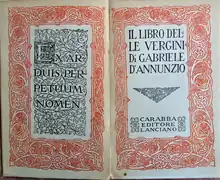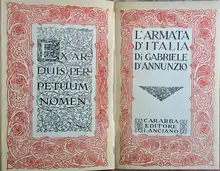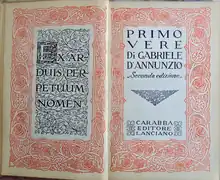Gabriele d'Annunzio
General Gabriele D'Annunzio, Prince of Montenevoso OMS CMG MVM (UK: /dæˈnʊntsioʊ/,[1] US: /dɑːˈnuːn-/,[2] Italian: [ɡabriˈɛːle danˈnuntsjo]; 12 March 1863 – 1 March 1938), sometimes written d'Annunzio,[3] was an Italian writer, poet, journalist and playwright. He was nicknamed "Il Vate" (The Poet) and "Il Profeta" (The Prophet) and he was associated with the Decadent movement.
Works

Gabriele d'Annunzio, Il Libro delle Vergini, Carabba, 1917

Gabriele d'Annunzio, L'armata d'Italia, Carabba, 1916

Gabriele d'Annunzio, Primo vere, Carabba, 1913
Novels
- Il piacere (1889)
- Giovanni Episcopo (1891)
- L'innocente (1892)
- Il trionfo della morte (The Triumph of Death, 1894)
- Le vergini delle rocce (The Maidens of the Rocks, 1895)
- Il fuoco ( The Flame of Life: A Novel, 1900)
- Forse che sì forse che no (1910)
Tragedies
- La città morta (The Dead City: a Tragedy, 1899).
- La Gioconda (Gioconda, 1899).
- Francesca da Rimini (1902).
- L'Etiopia in fiamme (1904).
- La figlia di Jorio (1904).
- La fiaccola sotto il moggio (1905).
- La nave (1908).
- Fedra (1909).
Short story collections
- Terra vergine (1882)
- Le novelle della Pescara (1884–1886)
Poetry collections
- Primo vere (1879)
- Canto novo (1882)
- Poema paradisiaco (1893)
- The five books of Laudi del cielo, del mare, della terra e degli eroi (1903–1912)
- Maia (Canto Amebeo della Guerra)
- Elettra
- Alcyone
- Merope
- Asterope (La Canzone del Quarnaro)
- Ode alla nazione serba (1914)
Notes
- "d'Annunzio, Gabriele". Lexico UK Dictionary. Oxford University Press. Retrieved 7 August 2019.
- "D'Annunzio". Merriam-Webster Dictionary. Retrieved 7 August 2019.
- As he used to sign himself (Guglielmo Gatti, Vita di Gabriele d'Annunzio, Firenze, 1956, pp. 1–2).
This article is issued from Wikipedia. The text is licensed under Creative Commons - Attribution - Sharealike. Additional terms may apply for the media files.